Aug 24, 2017
Studying Japanese: pre-Japan, motivation, environment, advice and more
Is it a given that having moved to Japan (however temporarily) one has a bash at studying Japanese? We'd venture to say so in most cases but it is perhaps not always thus. However, questions of whether or not the expat in Japan is somehow socially obliged to study Japanese are not the target of our concern here. We want to look at how those who do study Japanese (to whatever extent) feel about it, where they like to do it, how often, with what degree of motivation, and finally, what the hardest aspects of Japanese are to get to grips with. These are some of the questions we posed to City-Cost users in the latest "Tell us". This corresponds with one of the blogging themes currently up, inviting people to share their experiences, advice and tips about studying the language.
Did you study Japanese (to any degree) before you moved to Japan?
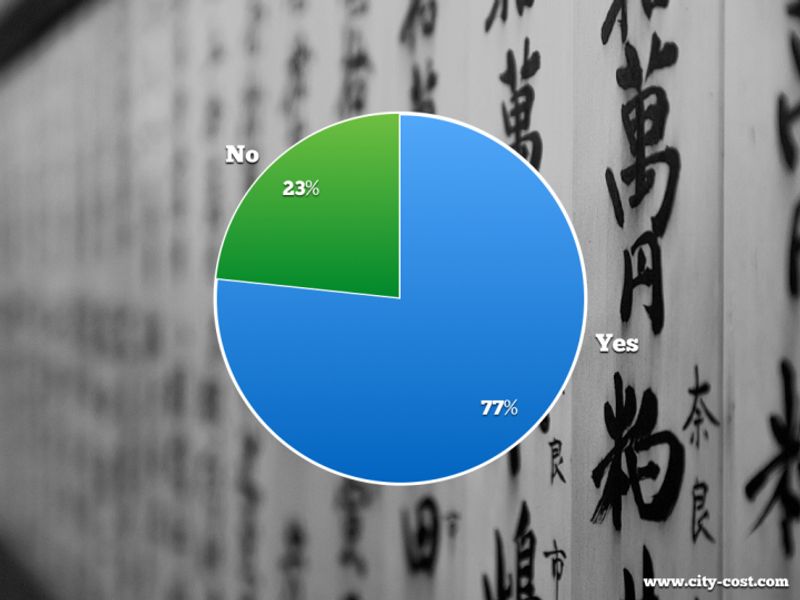
This expat had a go at studying Japanese before arriving in Japan. It was a cursory effort at best and it turns out to have been from a textbook that was very dated. It ultimately lead to disappointment that manifested itself when just a few days after arrival a fellow newbie and I went for some drinks and I loosed off some of the Japanese phrases I had learned to the bar staff, hoping to impress said newbie. Every word however (apart from "beer"), seemed to fall on deaf ears and left me looking like a plonker.
A simple, "Yes" or "No" answer to the above question perhaps doesn't cut things here. It's understandable that one might have a go at learning of the language of the destination country, especially if planning on an extended stay, but perhaps we should have gone into more detail as to the extent, environment, and purpose of said study, because as this expat learned, cursory efforts might as well amount to having not studied at all.
On a scale of 1 to 10, to what extent did your pre-Japan study of Japanese help you in your early days in the country?
(10 = extremely helpful)
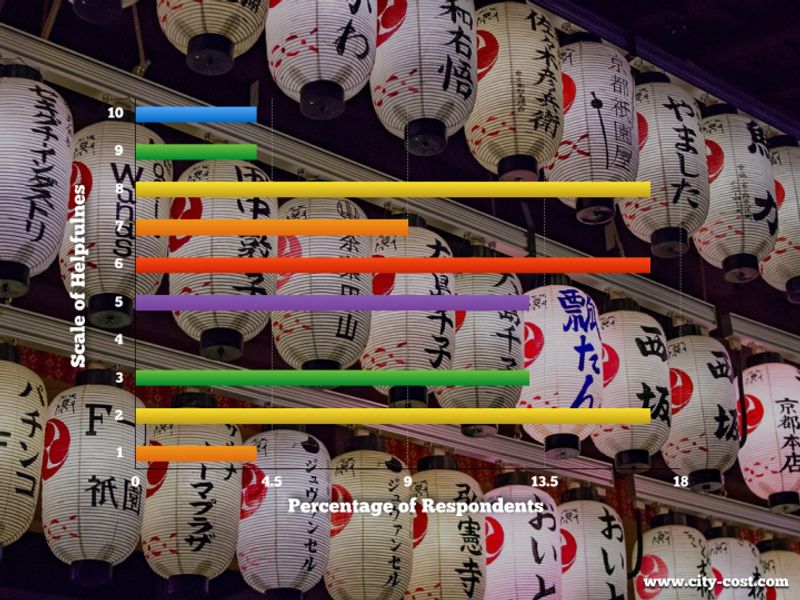
The motivation behind this question goes back to the point about having studied a little Japanese prior to arrival but it being of little use. The expectation here then, was that there might appear a significant gap between the study experience outside of Japan and the practical application of language learned, in Japan. This appears to have been the case for some as we can see in the chart above where the scale of "2" represents one of the larger percentages. Individual comments about this did indeed reflect the difference between study abroad and the actual use of the language, sometimes down to a lack of native speakers to practice with. There were also remarks about the content of courses taken outside of Japan having little practical application within Japan.
Equally though, people have found their pre-Japan study to be useful. The common sentiment here seems to be that it provided a good grounding from which to really kick on after arrival in Japan, often in the case of having got the learning of hiragana and katakana characters out of the way. Others also stressed the importance of this language foundation when it came to pursuing higher education in Japan.
On a scale of 1 to 10, how motivated were you to study Japanese when you first arrived in Japan?
(1 = not motivated at all)
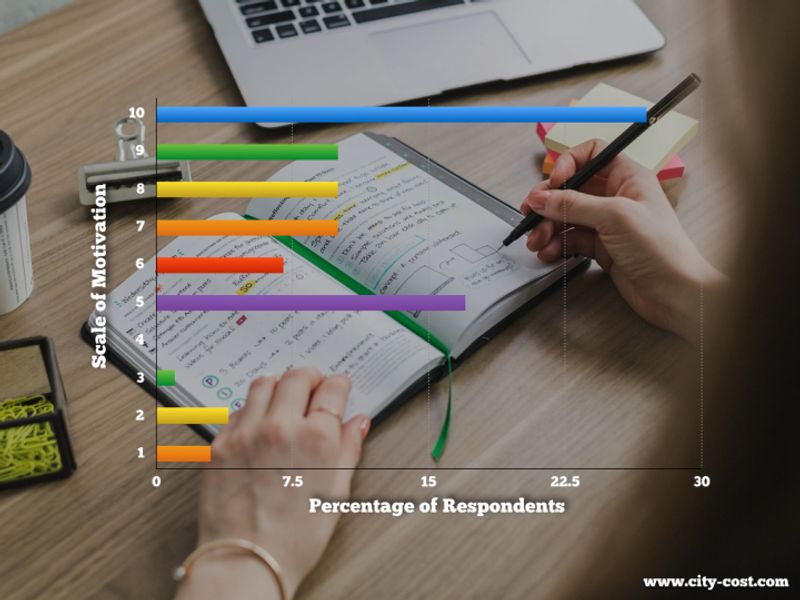
How motivated now are you to study Japanese?
(1 = not motivated at all)
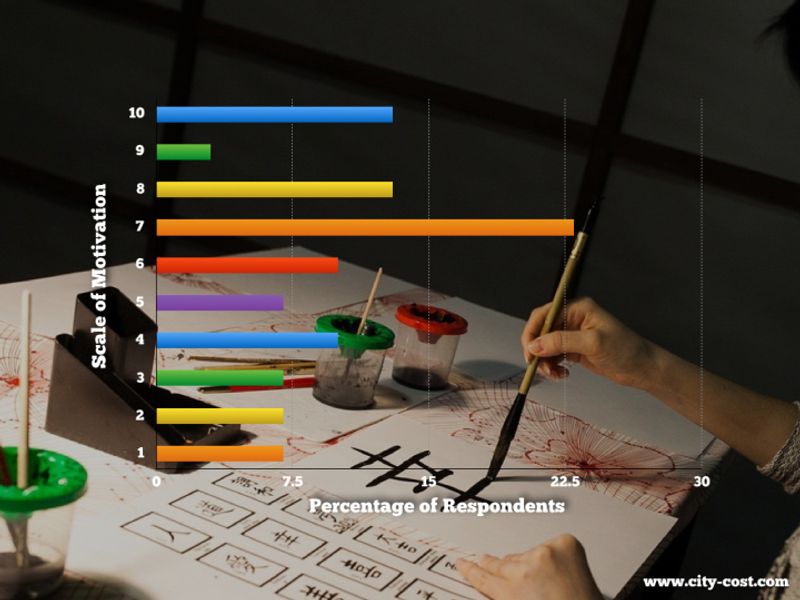
Perhaps it's no surprise to see that motivation to study Japanese can take a beating the longer one stays in Japan. Stress on the word "can" though. Personal experience shows this to be a bit up and down and also tied into factors like the job market (nothing like the prospect of money to get the study juices flowing) and perhaps also the dating scene.
A common pattern might also be tied into the realisation of how challenging it can be to really get on top of the language. You arrive on these shores all pumped up about the chance to call yourself "bilingual" only to find out somewhere in the Minna no Nihongo textbooks (the default texts for beginner Japanese learners) that this isn't going to come half as easily as you thought (and that it can be quite tedious).
For many longer-term expats in Japan, there might also come a time when they realise that they've come about as far as they can with the language study and thus "learn" to be comfortable with whatever level that might be.
Motivation to study Japanese can also take a hit when it becomes clear that fluency in Japanese alone might not equate to career progression. This expat thought that JLPT N2 would open up more doors that it actually did. There are plenty of foreigners that can speak Japanese to this kind of level and even better. It turns out then, that you've got to have some other skills through which you can apply it.
Currently, how often do you study Japanese (other than in any everyday use of the language)?
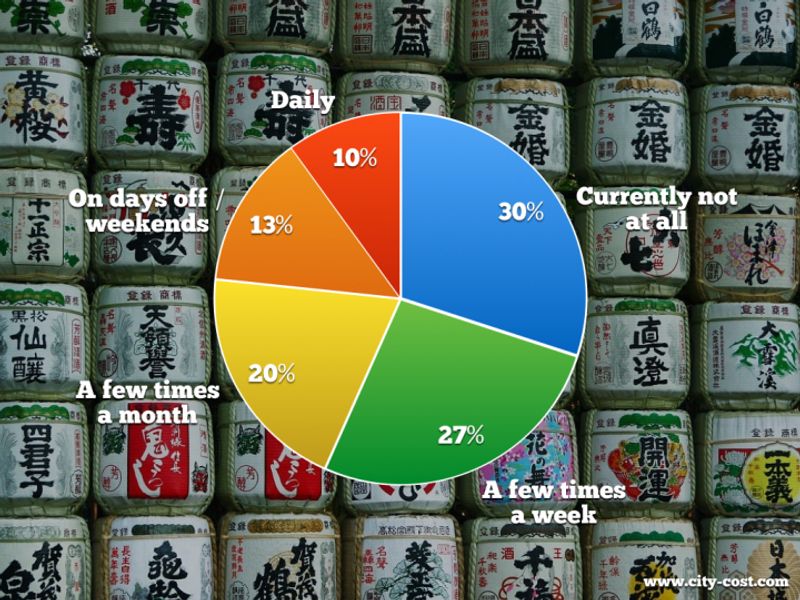
Even though the motivation to study Japanese is there (to a greater and lesser extent) we can see that for many it isn't enough generate "daily" study. While this wasn't asked, would it be fair to say that working full-time might have something to do with this? It can take an iron will to commit to daily study at the same time as holding down a job. It's interesting to see though, that the largest percentage of respondents aren't currently studying Japanese at all.
What, in your opinion, is / would be the best environment for you to study Japanese (in Japan)?
| 1 | Language exchange |
| 1 | Conversation school (private class) |
| 2 | Conversation school (group class) |
| 3 | Nihongo Kyoushitsu (community center volunteer classes) |
| 4 | Private lessons in a cafe, at home etc (not in a school) |
| 5 | A more formal language school |
| 6 | Self-study (no school, no teacher) |
Here we've collated individual rankings into one reflecting the average ranking across all responses. "Language exchange" comes out as the best environment in which to study Japanese. To be clear, though, by "language exchange" we meant that which is organized in a formal way (often by a matching service online) in which two language learners essentially start off by going on a blind date to a coffee shop and attempt to talk to each other, taking it in turns to use the language they want to learn.
Again, we didn't go into the details but the lower ranking of a formal language school perhaps reflects that these facilities are requiring of a significant time / financial commitment that might not be practical for many.
Self-study might be the lowest rank of all, but studying for Japanese tests such as the JLPT can add a good serving of motivation.
What is the hardest aspect of the Japanese language for you?
| 1 | Kanji (reading / recognition) |
| 2 | General writing |
| 3 | General reading |
| 4 | Grammar |
| 5 | Vocabulary |
| 6 | General listening |
| 7 | General speaking |
| 8 | Pronunciation (in speaking or listening) |
It's surely no surprise to see "Kanji" (the Chinese characters) heading up this list of the hardest aspects of the Japanese language, closely followed by reading and writing (in most cases reliant on a grasp of said kanji).
For someone about to start learning / studying Japanese for the first time in Japan what single piece of advice would you give them?
Below are edited or surmised versions of comments received about advice for studying Japanese, many of which shared the same sentiment ...
Learn hiragana and katakana as soon as possible.
Start at a language school to get the basics.
Find locals to talk to.
Stick at it.
Don't force yourself to learn it, learn it because you want to.
Put yourself in an environment where learning the language is the only way to survive.
Don't be afraid to make mistakes.
Listen as much as you can.
The most common piece of advise was to learn hiragana and katakana as soon as possible. For all but the most casual of Japanese language learning experiences, getting to grips with these two alphabets seems to be the foundation for most courses, programs and methods. Advise along of the lines of stick at it was also common. It would seem to be almost inevitable that learning any language is going to become a slog at times, and there will likely be periods when the learner feels like progress isn't being made. Personal experience agrees with the "stick at it" advice - the only way to continue improving is push through these difficult phases when studying Japanese becomes far from fun. If you can do this for long enough, it somehow clicks into place.
If you have any further thoughts, tips or advise to share about studying Japanese, particularly in Japan, let is know in the comments or create a blog post about them on City-Cost. We'd love to hear from you!
Further reading ...
Studying Japanese in Japan: A guide to the options and resources
Study Japanese in Japan: How much money do you need for class?
Surviving in Japan without speaking Japanese
See us on ...
Twitter: @City_Cost_Japan
Facebook: @citycostjapan



0 Comments